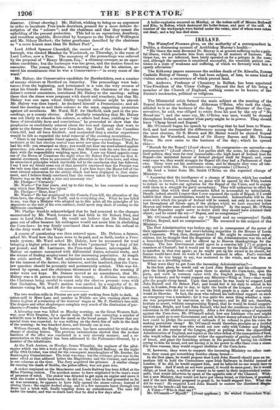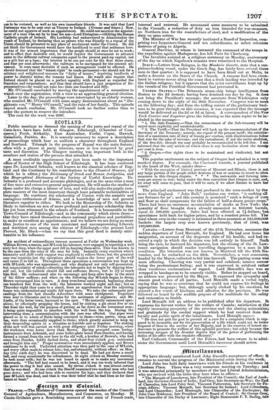IRELAND.
The Waterford Freeman gives, on the authority of a correspondent hi, Dublin, a distressing account of Archbishop Murray's health-
" His Grace the most Reverend Dr. Murray is at present suffering under a pain- ful illness, which precludes him from mixing in all matters of business. His Grace has, we are informed, been lately operated on for a polypus in the nose; and, although the operation is considered successful, the venerable patient con- tinues in a state of weakness and suffering, of which we fervently wish him a speedy alleviation."
The Kilkenny papers announce the sudden death of Dr. Kinsella, Roman Catholic Bishop of Ossory. He had been subject, of late, to some kind of violent attack; a recurrence of which proved fatal.
Dr. Andrews, Professor of Chemistry in Belfast, has been appointed Vice-President of the Ulster College. Beyond the fact of his being a member of the Church of England, nothing seems to be known of the Doctor's tendencies, political or religious.
The Ministerial crisis formed the main subject at the meeting of the Repeal Association on Monday. Alderman O'Brien, who took the chair, alluded to it as the business of the day. The great Minister of the Con- servatives, he said, was obliged to retire from his post by the cry of "No Bread-tax "-' and the same cry, Mr. O'Brien was sure, would be shouted throughout Ireland, no matter what party might be in power. They should. have " Cheap bread and RepeaL" Mr. O'Connell began his speech by reporting that he had been to Water- ford, and had reconciled the differences among the Repealers there. At the next election, Sir B. Morris and Mr. Maher would be elected Repeal. Members for Waterford, instead of Sir Henry Barron and Mr. Thomas Wyse. He now came to the business of the day; which he opened thus— "Hurrah for the Repeal ! (Loud cheers.) No compromise—no surrender—no postponement !" (Loud cheers.) Let parties shift the scene, let others change their politics, they were for ever immoveable—the high heart of Ireland beat for Repeal—the untainted honour of Ireland pledged itself for Repeal; and, come weal come we, they would struggle for Repeal till they had a Parliament of their own. These were not his sentiments alone, and he thought they were all tole- rably agreed with him. No surrender—no compromise ! (Cheers.) He read a letter from Mr- Smith O'Brien on the reported change of Ministry- " Assuming that the intelligence of a change of Ministry, which has reached me today, is correct, foresee that no pains will be spared by the Whig leaders to induce us to waive our agitation for the Repeal of the Union, and to engage with them in a struggle for party ascendancy. They will endeavour to effect by. corruption that which their adversaries filled to accomplish by intimidation. Deeply, indeed, should Iregret that I ever espoused the cause of Repeal if I could believe that these machinations would be successful. Indescribable will be the scorn with which the people of Ireland will be named, not only in our own time but throughout all future ages, if the pledges which we have recorded before Heaven and before man should so soon be forgotten.* In the sequel, Mr. O'Brien said that Repealers ought never to desist until they should have attained their object; and he raised tTie cry—" Repeal, and no compromise !"
Mr. O'Connell rendered the cry " Repeal and .no compromise! Smith O'Brien, Repeal, and no compromise!" He recurred to the subject of the Ministry— The Peel Administration was broken np ; not in consequence of the power of their opponents—for they bad overwhelming majorities mthe Houses of Lords and Commons. What, then, dissipated them? He might be considered super- stitious, but he thought that the aspersion of the Administration was the act of, a benevolent Providence; and he offered up to Heaven thanksgivings for the change. The late Government could agree in a coercion bill [ 7] or Flied a massacre at Clontarf; but it would not be necessary for the Duke of Wellington to interfere in that way again; so he might put up his sword in its sheath, for, famine would have done its work if he bad remained in office. Peel's wretched Ministry, he was happy to say, was scattered to the winds, and was then as harmless as a drivelling infant.
What were they to get from the incoming Administration?— In the first place, he would call on Lord John Russell and his colleagues to give the Irish people food—call upon them to abolish the Corn-laws, open the ports, and work in common cause with the English people.. That was his cry for Ireland; and -he would support any Ministry—Whig or Tory—that would give the people cheap bread. Upon that question he was ready to support Lord John Russell and Sir Robert Peel; and would feel it his duty to attend in his seat, in London, from day to day, to fight the battle of the League. And every Irish Member who did not wish to see the Irish people in a state of starvation would do likewise. In fact, the man who refused his individual support on such an emergency was a murderer • for it was quite the same thing whether a mur- der was perpetrated by starvation or the bayonet; and he did not, therefore, hesitate to assert, without compromising Repeal, that he would be found support- ing Cobden, Bright, and Lord John Russell, who had the manliness to declare his conversion to the abolition of monopoly. After a few desultory scraps of argument against the Corn-laws, Mr. O'Connell asked, how any Irishman who now might hesitate could go to any Government and ask to have money advanced forlabour- how could he pledge the security of railroads if he refused to give his voice for making provisions cheap? Mr. O'Connell would therefore proclaim as a decided enemy to Ireland any man who would not now rally with Cobden and Bright; triumph at the success of the League, glory at putting down the oligarchical Administration of England, and rejoice at the utter defeat of the monopolists of food, who would refuse the unfortunate widow the opportunity of getting another slice of bread, andplace the famishing artisan in the position of having his children crying to him for bread, and not having it in his power to offer them even a stone. For these reasons, they would support abolition of the Corn-laws.
lf, however, they were to support the incoming Ministry on other mat-' tore, they must get something besides cheap bread— In the first place, he would propose that Lord John Russell should pass an im mediate bill to hold the Committees upon Irish Railways in Dublin instead of London: if he did, he would support him, and he believed no one would dare to oppose him. And if such an act were passed, it would do some good; for it would oblige, at least help, a million of money to be spent in their impoverished metro- polis, that would otherwise be spent at the opposite side of the Channel. With- out a new Ministry, they would not have got cheap bread, or this boon, if granted; and if the new Minister proposed to grant it, he would support him. What else did he want? He required Lord John Russell to restore the dismissed Magis- trates to. the bench—all but-one.
A Voice—" Who is that one ? "
Mr. O'Connell—"Myself." (Great applause.) He wished Commodore Wat- son to be restored, as well as his own immediate friends. It was said that Lord Fartescue was to be sent over as Viceroy to Ireland. (Groans and hisses.) Now, he could not approve of such an appointment. He could not sanction the appoint- ment of a man who sat by to hear his son—Lord Ebrington—villifying the Catholic people of Ireland. His Lordship had endeavoured to denationalize the youth of Ireland, by declaring that no person who was friendly to a repeal of the Union should be promoted to any place of emolument under the Crown. He did not think the Government would have the hardihood to send that nobleman here. It was of the utmost importance that the people should at once be set to work; and to effect that desirable end, he would require the Government to advance sums to the different railway companies equal to the present paid-np capital, not as a gift but as a loan; the interest to be one per cent for the first three years, and four per cent afterwards; the railways to be mortgaged for the amount ad- vanced. It were most desirable if such an arrangement could be effected. lie should demand that the "tenant-right" be made permanent--he should ask for a salutary and enlightened measure for "fixity of tenure," depriving landlords of power to distrain unless the tenants had leases. He would alto require that Ireland should be placed on a perfect equality with England as regarded the franchise and corporations; and that they should have a jest proportion of Re- presentatives—he would not take less than one hundred and fifty. Mr. O'Connell concluded by moving the appointment of a committee to Watch over the registration, with a view to an approaching general election.
Later in the day, the proceedings were interrupted by an elderly woman, who assailed Mr. O'Connell with some angry denunciations about an "ille- gitimate son," " Henry O'Connell," and the ruin of her family. This episode caused much confusion. Mr. O'Connell took no further notice than to order the porters to remove the intruders.
The rent for the week was 2081.



























 Previous page
Previous page